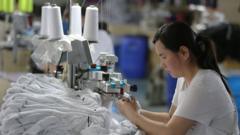During initial talks between US and Chinese officials in Switzerland, President Trump expressed optimism regarding a "friendly, constructive" atmosphere, framing the discussions as a significant shift in trade relations. However, the backdrop of escalating tariffs continues to challenge both economies, with mixed signals emerging about future concessions.
Trump Celebrates Progress in US-China Trade Talks Amid Ongoing Tensions

Trump Celebrates Progress in US-China Trade Talks Amid Ongoing Tensions
US President Donald Trump characterizes the latest trade discussions with China as a "total reset" in relations, even as economic pressures mount on both sides.
Donald Trump announced a "total reset" in US-China trade relations following the first day of discussions between American and Chinese officials in Switzerland. The president described the talks on his social media platform as "very good," highlighting that the exchanges had unfolded in a "friendly, but constructive" manner. The ongoing trade conflict has escalated to the point where the US has imposed tariffs as high as 145% on Chinese imports, and China has retaliated with tariffs of 125% on certain US goods.
This weekend's meeting in Geneva marks the first direct dialogue since the imposition of tariffs at the beginning of the year. Details regarding the negotiations remain sparse, but Trump’s announcement is seen as an optimistic sign. The discussions involve China's Vice-Premier He Lifeng and US Treasury Secretary Scott Bessent, with both parties aiming to find common ground while navigating complex economic landscapes.
Despite Trump’s positive comments, White House Press Secretary Karoline Leavitt emphasized that the US would not ease tariffs without corresponding concessions from China. In response, Chinese state media indicated that Beijing is engaging with Washington after analyzing global expectations and the impact on its internal markets, especially under pressure from its exporters facing the tariffs.
As the talks unfold, the underlying economic realities deepen. The BBC reported that some Chinese companies, such as Sorbo Technology, are facing significant challenges, with products destined for the US stockpiled due to the tariffs. Meanwhile, the US economy experienced a contraction of 0.3% in the year’s first quarter, as companies rushed to import goods before additional tariffs could be enacted.
The backdrop of these discussions includes Trump’s recent announcement of a universal tariff baseline targeting around 60 nations, which he labeled "Liberation Day." This initiative aims to rectify what he perceives as long-standing unfair trade practices, with China and the European Union designated as key targets. Additionally, recent negotiations resulting in a trade deal with the UK, reducing tariffs on car exports, illustrate the complexities and international implications of these tariffs.
While optimism looms over the current trade talks, the actual path towards a comprehensive trade resolution remains fraught with uncertainty and challenges for both nations.




















